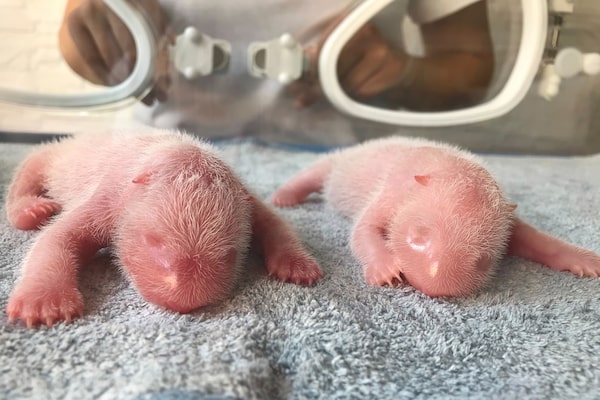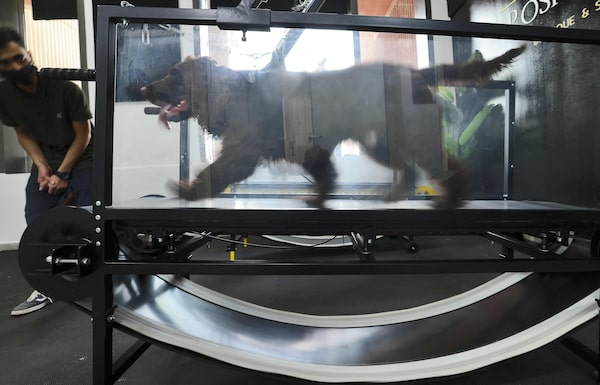If you’re reading this on the web or someone forwarded this e-mail newsletter to you, you can sign up for Globe Climate and all Globe newsletters here.
Good afternoon, and welcome to Globe Climate, a newsletter about climate change, environment and resources in Canada.
China’s unofficial mascot has been struggling for survival amid climate change and loss of habitat. That’s why there was a little extra excitement when twin giant pandas were born at the Qinling Panda Research Center in Shaanxi province.
The population of wild pandas has ticked up gradually, in part thanks to captive-bread pandas being released into the wild like the heavily forested province of Sichuan. But much of central and western China has been hit by soaring summer temperatures and drought this year that have sparked forest fires and the withering of crops and forests.
Now, let’s catch you up on other news.

This photo released by Qinling Giant Panda Research Center, shows newly born twin Panda cubs, male at left and female at right, at the center in Xi'an, in northwestern China's Shaanxi Province on Tuesday, Aug 23, 2022.The Associated Press
Noteworthy reporting this week:
- Agriculture: The rising value of farmland represents a hurdle for the next generation of young farmers become more vulnerable
- Parks Canada: Climate change and traffic congestion targets unveiled for mountain destinations, including Banff National Park
- Energy: Canada signs non-binding agreement with Germany to export hydrogen to Europe by 2025. Scroll down to the opinion section for more commentary and analysis on the partnership.
- Oil and gas: Oil sands industry wants tax credit review after U.S. goes big on carbon capture
- From The Narwhal: On condo balconies and in front yards, gardeners across the Greater Toronto Area are fighting grocery bills, food insecurity and stress
A deeper dive
A recent study shows you lose 44 hours of sleep a year due to climate change
Sierra Bein is the author of Globe Climate. For this week’s deeper dive, she catches you up on a Decibel Podcast episode exploring the ways a warming climate affects sleep.
The University of Copenhagen published research earlier this summer indicating that as the climate warms, people are losing sleep.
Not exactly because of climate anxiety, but because researchers found that the chance of having a short night of sleep steeply increased as temperatures became warmer. Sleep loss per degree of warming was twice as large among the elderly compared to younger or middle-aged adults. It was three times larger for lower income versus high income countries, and it was significantly larger for females compared to males.
Kelton Miner is the lead author of that study, and a researcher and Ph.D. candidate at the university. He spoke with Decibel host Menaka Raman-Wilms on a recent episode of The Globe’s podcast.
Miner said that ambient temperatures outside are warming faster at night in most regions as a result of human-caused climate change, affecting human sleep outcomes globally.
And yes, they found that about 44 hours of sleep are lost per year per person. And without further adaptation, we would expect that by 2099 that will exceed about 50 hours per year per person.
Sleep helps to regulate our mood, our emotions, and even is involved in the clearance of neurotoxic metabolites that we produce every day. Just doing the cognitive work that we put in every day as humans. It also is really important for human performance, not just for athletes, but for everyday co-ordination. And it’s really important for our cardiovascular health as well.
What can we do about this?
As long as temperatures are expected to keep rising, we can expect our sleep to get worse. Air conditioning is a temporary solution, but not accessible to all and in the long run it’s still an environmental stressor.
So think of this this way: the emissions reductions that we make today will directly translate into how well you sleep during hot nights globally in the future without further adaptation.
That’s not something to snooze on.
You can listen to the full episode today. For the best listening experience and to never miss an episode, subscribe to The Decibel on your favourite podcast app or platform: Apple Podcasts, Spotify, Amazon Music, Stitcher, Google Podcasts, iHeartRadio, Pocket Casts and Youtube.
Psst... While you’re there, check out this recent episode as well, about Investigating the explosion that rocked a small town. The cause is assumed to be an “orphan” natural gas well tucked away near a building’s basement, one of many thousands left behind after the last 150 years of oil and gas drilling in Ontario. You might remember the story from before.
- Sierra
What else you missed
- Concern for B.C. sockeye salmon as Fraser River return estimates drop by millions
- Floods, droughts and major storms could cost Canada’s economy $139-billion by 2050: report
- Native groups seek to repair lands damaged by colonization
- Ottawa signs agreements with Mercedes-Benz, Volkswagen on materials for electric vehicles
- International aid reaches flood-ravaged Pakistan as crews continue trying to rescue stranded residents
- Africa looks to UN talks for clean energy, financial growth
- California to ban sale of new gasoline-powered cars by 2035
- Drought forces earliest harvest ever in French wine country
- Nations fail to reach deal on UN treaty to protect sea life
- Swiss group to launch petition to rethink nuclear power closure plans
Opinion and analysis
Adam Radwanski: How Trudeau could use his new friendship with Germany to help fix Canada’s carbon-pricing system
Kelly Cryderman: German Chancellor Scholz’s visit failed to address the elephant in the room
Andrew Willis: Germany looks past VW and Mercedes deals to deeper Canadian partnerships
Adam Radwanski: Canada’s moment with Germany won’t last long unless Ottawa now does the hard work
Mike Tipton: Why we should name heat waves like we name storms
Editorial Board: Canadian hydrogen versus Canadian natural gas? Let investors decide
Peter Kuitenbrouwer: Cycling in the Netherlands was a balm to my spirit. How can we replicate this in Canada?
Green Investing
As ESG strategies change, impact investing is on the rise
Environmental, social and governance-themed investing has taken its knocks this year, and an alternative, has grown in Canada.
Impact investing and its proponents hope that more retail investors will soon have access to options that promise measurable social and environmental improvements along with financial returns. Early adopters of sustainable investing are moving over to the impact world as they seek greater alignment with their values and possible also to distance themselves from some of the ESG controversies. Jeff Jones has more details in his story here.
Making waves
We will be taking a break from publishing profiles this summer! But we’re still looking for great people to feature. Get in touch with us to have someone included in our “making waves” section after the summer.
Do you know an engaged individual? Someone who represents the real engines pursuing change in the country? Email us at GlobeClimate@globeandmail.com to tell us about them.
Photo of the week

A dog runs on a treadmill at the 'Posh Pets' boutique and spa in Abu Dhabi on August 16, 2022. the Gulf's increasingly fierce temperatures becomes dangerous to health amid fears over the pace of climate change, those who can afford not to work outside in the blazing sun stay inside in air-conditioning. And for owners of pampered pets able to splash the cash, an air-conditioned gym for dogs has become an attractive option.KARIM SAHIB/AFP/Getty Images
Guides and Explainers
- Want to learn to invest sustainably? We have a class for that: Green Investing 101 newsletter course for the climate-conscious investor. Not sure you need help? Take our quiz to challenge your knowledge.
- We've rounded up our reporters' content to help you learn about what a carbon tax is, what happened at COP 26, and just generally how Canada will change because of climate change.
- We have ways to make your travelling more sustainable and if you like to read, here are books to help the environmentalist in you grow, as well as a downloadable e-book of Micro Skills - Little Steps to Big Change.
Catch up on Globe Climate
- Hydrogen is a big bet game, Canada could hit the jackpot
- Is the U.S. climate bill great news for Canada?
- These drones are helping plant trees
- The simmering feud over an Alberta town’s possible return to coal mining
We want to hear from you. Email us: GlobeClimate@globeandmail.com. Do you know someone who needs this newsletter? Send them to our Newsletters page.